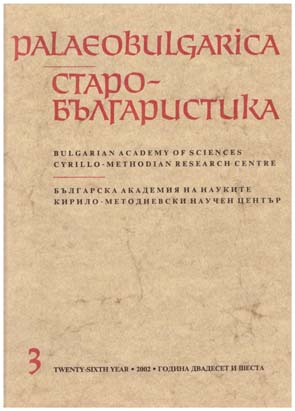Каноните за св. Иван Рилски от Георги Скилица
The Canons for St. Ivan Rilski by Georges Skylitzes
Author(s): Ivan DobrevSubject(s): Language studies
Published by: Кирило-Методиевски научен център при Българска академия на науките
Summary/Abstract: The article is dedicated to the canons in the early services for St. Ivan Rilski. According to information contained in Russian copies, there should exist a canon with the acrostic “Accept the unworthy chant of Georges”, which is not attested in the Old Bulgarian tradition. Its author could have been Georges Skylitzes, Byzantine poet and governor of Serdica (Sofia) during the reign of Emperor Manuel I Comnenos. Skylitzes was healed miraculously through the relics of St. Ivan in Serdica, and in honour of the thaumaturge he wrote a Greek vita which has survived only in Old Bulgarian translation. In addition there should also exist the Greek canon with the indicated acrostic in Old Bulgarian translation. In order to discover the acrostic a reverse translation was made from Greek into Old Bulgarian. The Greek acrostical phrase “Accept the unworthy chant of Georges” was not discovered but it was established that there had been three Greek canons by Georges for St. Ivan that were all translated into Old Bulgarian. The acrostical phrases in them are: Ivan, I shall glorify you in Serdica. I glorify you now, Ivan. Skylitzes and Ivan... Georges. Together with the fourth canon that has not been discovered yet and with the Life of St. Ivan Rilski by Georges Skylitzes they form a cycle of Byzantine works dedicated to the Rila hermit and are the foundation of the hagiography of the great Bulgarian saint. On the basis of these new data the assumption that there was some comprehensive early Rila service in honour of St. Ivan is quite untenable. The Old Bulgarian canons already have an established author – Skylitzes – and do not contain a Rila Monastery text. The position of Georges Skylitzes not only as a hymnographer but also as a historical author gains additional importance. We should also take into consideration his indication that St. Ivan Rilski was a contemporary of Emperor John I Tzimisces. It should not be discarded because of legendary or unauthentic reports that have influenced Bulgarian historiography so far. This calls for a new approach to St. Ivan Rilski in research.
Journal: PALAEOBULGARICA / СТАРОБЪЛГАРИСТИКА
- Issue Year: 2002
- Issue No: 3
- Page Range: 3-12
- Page Count: 10
- Language: Bulgarian
- Content File-PDF

